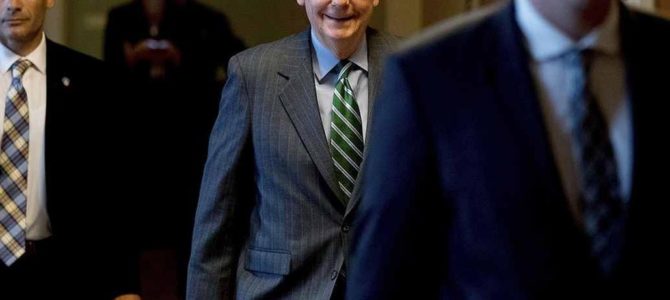The Senate is reconvening this week after having already passed four rounds of coronavirus stimulus totaling more than $3.5 trillion while House Speaker Nancy Pelosi has decided to keep members in the lower chamber home until the next session citing rising cases of coronavirus in the nation’s capital.
With seven months to go until election day, the time is now for Senate Majority Leader Mitch McConnell to keep moving on his pledge to “leave no vacancy behind.”
The mantra has become McConnell’s motto, and even as the pandemic over the novel Wuhan coronavirus has reached full-bloom, the Kentucky senator said just last month that things haven’t changed.
“The pandemic will not prevent us from achieving that goal,” McConnell promised on the “Hugh Hewitt Show.”
The Republican leader has already marshaled more than 200 federal judges through Senate confirmation to date, including two Supreme Court justices after navigating bitter partisan battles on Capitol Hill that culminated in the destruction of the Senate filibuster rule for Supreme Court nominees and the erosion of presumptive innocence applied to allegations of sexual misconduct.
Eighty-three vacancies remain unfilled however, with 43 nominees pending as of this week while the Republican-led Senate returns to session. Even as the current public health emergency lingers over Congress, its legislative work must not come to a halt while Republicans still hold power both in the White House and the upper chamber presenting a prime opportunity to cement fundamental change in the federal judiciary with potential to have an impact likely to last generations.
One of those nominees include McConnell’s 37-year-old protege Justin Walker, who also hails from the Bluegrass State, and is up for a seat on the powerful U.S. Court of Appeals for the District of Columbia. Walker’s Senate hearing is slated to take place this week but is facing opposition from Democrats and left-wing groups ramping up resistance to more confirmations, citing a litany of reasons including the current public health crisis as an excuse to keep conservative judges from reaching the bench and Walker’s affiliation with The Federalist Society.
In March, Walker joined more than 200 judges in a letter defending their associations with The Federalist Society which has become a breeding ground for judges who adhere to the strict constructionist confines of the Constitution.
Walker and others pushed back on a panel of federal judges calling for a judicial ban on retaining membership to the society and argued the panel had engaged in a double-standard for not doing the same with the American Bar Association (ABA) which has faced its own issues of impartiality.
Democrats often cite the association’s ratings as the “gold standard” for evaluating nominees and have used Walker’s “not qualified” rating as further ammunition to oppose the Kentucky native’s confirmation despite Democratic Minority Leader Chuck Schumer having a long history of supporting “unqualified” candidates for federal judgeships in the past.
Even so, Republicans don’t need Democratic support to confirm federal judges, and with just a few months to go until this year’s elections come into full swing, the matter is urgent.
Several other nominees have already defended themselves through Senate hearings and have been waiting for a confirmation vote ever since, including Trump’s pick for a seat on the Court of International Trade where a fifth of the bench remains vacant.
Stephen Vaden, who currently serves as the general counsel for the U.S. The Department of Agriculture was approved by the Senate Judiciary Committee more than four months ago and is still waiting for the Senate’s final stamp of approval.
Democrats will predictably bemoan the Senate’s decision to divert any attention away from spending trillions more on coronavirus relief as a symptom of resentment over McConnell’s success with filling federal judgeships. With the House gone this week however, nothing the Senate passes in way of federal assistance will reach the president’s desk anytime soon, and judicial nominations will only become more political as the elections draw near. Besides, one would at least hope that any competent government would be able to walk and chew gum at the same time.








